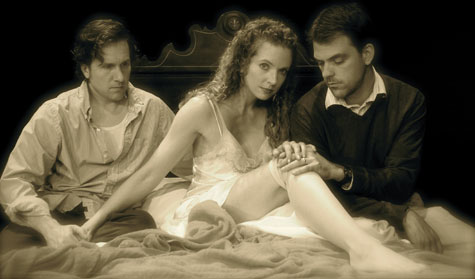
PASSION + RESTRAINT British infidelity in Pinter’s Betrayal. |
Harold Pinter's masterwork Betrayal is a story of a British triangle: Emma (Jennifer Porter), the wife of book publisher Robert (Rob Cameron), has had a long affair with his best friend, literary agent Jerry (Dana Packard). Cue the usual results — revelations, hurt, an array of aching ends. Pinter's simple but revelatory innovation is to tell the story in reverse: The focus of suspense is not on what happens, but on how and why, the question of who knew what and when, of who revealed or hid what from whom. In moving us backward through time, Pinter guides us into the sad and gossamer detective work of memory itself. Packard and Porter direct a tense production of this drama for the Originals, at the Saco River Grange Hall.
As we retrace the threesome's vicissitudes of broken faith, we see them mostly in pairs, in the charged territories of Jerry's home, Robert and Emma's home, and Jerry and Emma's secret rented flat, as well as neutral locations like the pub or a restaurant. But deconstructed elements of all the places where they meet are evocatively visible at all times, in Porter's excellent set design: The furnishings of each scene — the red leather chair from Jerry's study, the bed of several bedrooms, the sofa and tables of other rooms — are stored en masse upstage of the action, as if in slightly removed but ever-present thought. The one set element that doesn't move is a trio of beautifully laden bookshelves at left, right, and center, a poignant reminder of the literary affinities that unite all three characters.
Jerry has been a friend of Robert's since they were both poetry editors in college, but we first encounter him having drinks with Emma, years after their affair is done. Emma has called him spontaneously, upon learning of her husband's own infidelities over the years, but the news doesn't revive anything between the former lovers: Their civility is slow and careful, though Emma's persistent smile and her wealth of untold tension strain against it. As the scenes move back in time, we work up to climaxes of closure and disclosure — a trembling Emma returning her flat key to Packard's affectingly helpless Jerry; Emma taut with anxiety in bed beside Robert, who, suspecting her infidelity, baits her confession out of her with a jocular hint of sadism.
Less acute than the two sexual relationships, the friendship between Robert and Jerry is in some ways even more interesting; the scenes between them are spare, funny, and remarkably poignant. Their deceptively inane banter about books, waiters, and playing squash pulse with the unsaid. Cameron, with his urbane, laconic Robert, is particularly masterful in suggesting the ambivalence beneath a persona unused to processing emotion. As they talking of male babies leaving wombs, he and Packard compellingly create a different, more comedic, and more complicated kind of love tragedy, one between two self-consciously witty men — Brits, no less — who even without their woman problems have fundamental limitations in expressing their affection.